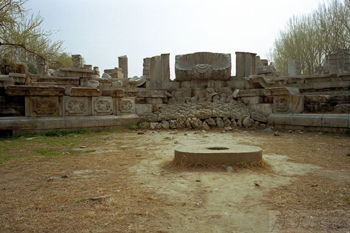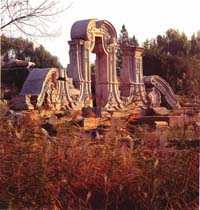Yuanmingyuan ruins [file photo]
Nearly 60 percent of netizens are against plans to reconstruct Beijing's Old Summer Palace, or Yuanmingyuan, a new on-line survey shows.
Conducted by www.people.com.cn, the survey had attracted 181,576 responses since views were requested in October.
A total of 58 percent voiced their opposition to rebuilding the palace, an imperial summer resort destroyed in 1860 by British and French forces, while 15 percent wanted some parts reconstructed. About 25 percent thought it was proper to restore the original appearance of the palace.
Two projects on reconstructing the Old Summer Palace have recently renewed debate on the best way of dealing with the war-battered imperial palace located in northwest Beijing.
Earlier this month, Hengdian Sannong, formerly known as Hengdian Social and Economic Federation, announced that the construction of a full-size replica of Yuanmingyuan in east China's Zhejiang Province would start next year. It was scheduled to be completed within five years.
With a budget of 20 billion yuan (2.7 billion U.S. dollars), it has so far raised 1.16 billion yuan from private enterprises.
The replica construction plan, however, has met with fierce public criticism ever since it was announced.
"Yuanmingyuan took 150 years to build. It can not be recreated in five or 10 years,"
said Ruan Yisan, director of the State Institute of Famous Historical and Cultural Cities with the Shanghai-based Tongji University.
Separately, Yuanmingyuan initiated a reconstruction project to rebuild some of the palace's original buildings earlier this month, something that had aroused great public concern.
Shan Jixiang, director of the State Administration of Cultural Heritage (SACH), told the national newspaper People's Daily that the on-going project in the Old Summer Palace was already approved by the administration.
Shan, however, stressed that instead of massive restoration, the project would only "rebuild some buildings of the palace under the guidance of its original appearance, such as several garden gates or supplement facilities".
In the on-line survey, a netizen, with IP address 121.26.33, wrote: "The present-day ruins of Yuanmingyuan serves as a testimony to that period of humiliating history, because the palace was destroyed by the allied forces."
"Can't we maintain the present-day ruins of Yuanmingyuan just like Israel keeps its Wailing Wall," wrote another netizen named "Blue".
Many netizens complained the capital should be used on improving people's livelihood in areas including employment, social security and education. It would be better used on spending more energy and money in rural areas and underdeveloped western regions of China, instead of rebuilding a palace just for "visual enjoyment".
The public has received a larger voice from the decision-making authorities in China in recent years.
In a recent case, two public hearings were held in the coastal city of Xiamen in southeast China's Fujian Province last week on whether to restart construction of a controversial chemical plant that was suspended earlier this year following persistent public protests.
The Xiamen authorities put a paraxylene (PX) plant project, earmarked for Haicang District 16 kilometers from the city center, on hold on May 30. The decision came after huge pressure from citizens opposed to the project who said it was polluting and potentially dangerous.
Located in northwest Beijing, Yuanmingyuan was burned down by British and French troops in 1860. It was sacked and burned down again, after a partial restoration, in 1900 when the Eight-Power Allied Forces -- troops sent by Britain, the United States, Germany, France, Tsarist Russia, Japan, Italy and Austria -- occupied Beijing.
The 170,000-square-meter palace is composed of Yuanmingyuan, Changchunyuan and the Yichunyuan gardens.
(Xinhua News Agency December 21, 2007)



